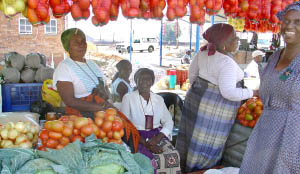By MILDRED KATONGO –
AGRICULTURE is an important driver of economic growth in developing countries, Zambia included.
Yet it is women who make up the majority of the small-scale farmers and produce up to 80 per cent of the food consumed locally. They play a critical role in driving agriculture in Africa.
Zambia’s agriculture sector has seen an increase in women who engage in farming activities.
The Zambia Demographic Health Survey of 2007 indicates that agriculture in Zambia supports more than 70 per cent livelihoods.
About 78 per cent of women are engaged in farming compared to 69 per cent of men.
As evidenced from the statistics, women are the backbone of the economy despite the numerous challenges that they face in accessing mostly finance and other related services, things that are a crucial resource for them to engage in farming.
There is no doubt that women make important contributions to agriculture and rural economies.
The contribution from the hardworking women farmers has seen an increase in food security and production in the country. This has contributed to the growth of the economy.
Despite being the major players in the agriculture sector, women have several challenges that limit enhancement of productivity such as lack of access to mechanised equipment as well as finances.
Women lack equal access to resources and this significantly limits their productivity because most of the farming activities which they embark on is labour-intensive.
The womenfolk also face challenges in getting their produce to markets, especially in rural areas where the road network is bad. As a result perishable produce goes to waste.
All these are the contributing factors that limit enhancement of productivity in the agriculture sector.
Agriculture Deputy Minister Maxas Ng’onga applauded women’s contribution to the agriculture sector in an interview recently.
Mr Ng’onga said in in Kitwe that the Government was aware of the massive contribution that women were rendering to the agriculture sector.
He said measures would be put in place to ensure that women farmers received the support they needed.
The deputy minister said he was impressed that women were contributing to the economy by engaging in farming activities to produce food which was consumed locally.
It was for this reason that the Government would strive to ensure that women were supported in the farming activities.
“We are aware of the many challenges that women in agriculture are facing,” Mr Ng’onga said. “As Government we will provide all the necessary support financially or anything that is needed to help the women continue to contribute to the economy.”
He said that the Government would support farming activities in order to diversify the country’s economy and reduce dependence on the mining sector.
It was discovered during the recently-ended 58th Copperbelt Mining, Agriculture and Commercial show (CMACS) that about 80 per cent of the exhibitors in the farming category were women.
CMACS president Bill Osborne observed during the award presentation ceremony that for the past years women had continued to be the majority exhibitors in the agriculture category.
A good example was Susan Musumali, a 70–year-old farmer from Chambishi who was awarded for being consistent in exhibiting her farm produce.
Ms Musumali has been exhibiting at the show for the past 20 years.
The farmer, who could not hide her joy when she received her award, encouraged other women to engage in farming to reduce the poverty levels in the country.
Ms Musumali started farming while she was young. She has managed to send all her seven children to school through farming activities.
“I started farming when I was young and today, I am proud because I have educated my children through farming,” she said. “I encourage other women to join in the farming sector and help contribute to the economy of the country.”







